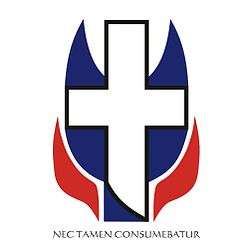Uniting Presbyterian Church in Southern Africa
The Uniting Presbyterian Church in Southern Africa (UPCSA) was formed and constituted in 1999 as the outcome of the union between the Reformed Presbyterian Church in Southern Africa (RPCSA) and the Presbyterian Church of Southern Africa (PCSA).
| Uniting Presbyterian Church in Southern Africa | |
|---|---|
 NEC TAMEN CONSUMEBATUR | |
| Classification | Protestant |
| Theology | Reformed |
| Polity | Presbyterian |
| Associations | All Africa Conference of Churches; World Communion of Reformed Churches; World Council of Churches; South African Council of Churches |
| Region | South Africa, Zimbabwe and Zambia |
| Origin | 26 September 1999 Port Elizabeth |
| Merger of | Reformed Presbyterian Church in Southern Africa & Presbyterian Church of Southern Africa |
| Congregations | 473 |
| Members | 80,000 [1] |
These two churches shared the same origin dating back to the 19th century when Britain took over the Cape Colony. Their distinctive characters were that the Presbyterian Church in Southern Africa was constituted among soldiers and settlers who arrived in the Cape in 1820, spreading North into Zimbabwe and Zambia. The Reformed Presbyterian Church on the other hand was a product of Scottish missions intended for the indigenous Africans, which started at Lovedale Mission in Alice. It became autonomous in 1923.
In 1896 the first Presbyterian congregation was founded in Rhodesia at Bulawayo, and later in 1903 in Salisbury (now Harare). Now there are 2 Presbyteries in Matabeland and Mashonaland. Currently there are 10 congregations and 5,000-10,000 members.[2]
The motto Nec tamen consumebatur is adapted from the Latin translation of Exodus 3:2 "...The Lord appeared to him in a blazing fire from the midst of a bush; and he looked, and behold, the bush was burning with fire, yet it was not consumed"
In 2004 the UPCSA celebrated its fifth anniversary after having spent much of that time in forging structures of union.
In 2015, a church court decided that "the Presbyterian church allows gay marriage" and that each minister may act according to his or her conscience. [3]
Presbyteries
The Uniting Presbyterian Church in Southern Africa has over 450 congregations and 800,000 members[1] and is divided into the following Presbyteries (regional districts):
South Africa
- Amathole
- Central Cape
- Drakensberg
- eGoli
- eThekwini
- Trans Xhariep
- Highveld
- Lekoa
- Limpopo
- Thukela
- East Griqualand
- Mthatha
- Tiyo Soga Memorial
- Tshwane
- Western Cape
Zambia
- Copperbelt
- Munali
- M'chinga
Zimbabwe
- Zimbabwe
Associations/Ministry Groups
The Basis of Union is a contract that was signed in September 1999 entered into between the Presbyterian Church of Southern Africa (PCSA) and the Reformed Presbyterian Church in South Africa (RPCSA). Under this contract, the two churches would join and become one: the Uniting Presbyterian Church in Southern Africa (UPCSA). Article 13 of the basis of union states that, as a condition of the union, both churches are to bring 4 associations each and the 8 associations would unite to form only 4 associations (one women's association, one men's association, one girl's association and one youth association).
- The GCA (Girls' Christian Association) of RPCSA and JB (after Janet Burnside the wife of Rev. Tiyo Soga) of PCSA united to form IYZA (Inhlangano Yezintombi ZamaRhabe Amanyanayo)
- The two women's associations united to form UPWF (Uniting Presbyterian Women's Fellowship)
- The PMA (Presbyterian Men's Association) of PCSA and the YMG (Young Men's Guild) of RPCSA united to form MCG (Men's Christian Guild)
- The two youth associations united to form UPCSA YF (Youth Fellowship).
See also
Confession of Faith
- Nicene Creed
- Apostles Creed
- Faith of the Uniting Presbyterian Church in Southern Africa. 2013
- Declaration of faith for the Church in Southern Africa. 1986
Further reading
- De Gruchy, John W. (2005). The Church Struggle in South Africa. Fortress Press. ISBN 978-0-8006-3755-2.
- Fahlbusch, Erwin (2008). The Encyclopedia of Christianity. 5. Wm. B. Eerdmans Publishing. ISBN 978-0-8028-2417-2.
References
- http://www.sachristian.co.za/church.html
- http://relzim.org/major-religions-zimbabwe/reformed/
- Rickard, Carmel. "Church gives blessing to pastors over gay marriages". Rand Daily Mail. Retrieved 2016-08-11.